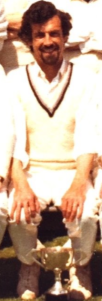
It is not unusual, when a cricket fanatic is asked to explain his devotion to the game, that he or she becomes stuck for words. For many, their attachment to the summer game is so visceral, so much a part of who they are, that they can no more explain it than they could explain breathing or eating. It’s a game that can get into your soul.
However, when I heard the sad news that Hugh Kilpatrick had died, it occurred to me that, in all that he was, in his character and personality, he would make a fine explanation of the myriad elements of a love of cricket.
Hugh played for many years for Holy Cross Academicals in the East of Scotland league, and was known throughout the game in central Scotland. One of the earliest club members, playing from 1951, after Holy Cross was founded in 1950, he embodied the links with the old school and its alumni in many ways, and was fundamental in developing a club which was rightly famed for its diverse and universal recruitment policy, decades before such attitudes became recognised as the correct way to proceed.
When I joined the club in 1974, he was club captain, and though my links with Holy Cross were through my father and his siblings many years before, I was welcomed as a long lost friend. It was important to a new player that the Captain, like other senior players, took the time to acknowledge a newcomer, and along with Roddy Regan, Alan Reid, the Balfours and others, he was responsible for the difficult task of preserving both the “FP” element of the club, and merging it with a recruitment policy that welcomed players from all over the world and from many different backgrounds.
To introduce more etymology, as a cricketer and as a man, he epitomised the word “dapper”. His cricket gear was always immaculate, as was his strokeplay, his bowling, and, in particular, his fielding. I never played with a more complete or effective fielder, and I recently learned that he scored the club’s first ever century in a match against Greyhounds in 1968. His leg break bowling was, unsurprisingly, accurate and teasing.
He was a player who was “neat” and correct in every part of his game, and one of the easiest coaching instructions in my early days at Cross was “Just watch Hugh Kilpatrick.”
Off the field he was equally smart and always well presented, and it was a common sight, in the years after he retired from playing, to see him circling the boundary at each of the Holy Cross fixtures, raincoat open despite the weather, a cloud of tobacco smoke following his progress. Players of all generations welcomed his presence – for his inevitable encouragement, his willingness to listen and advise, but also as that tangible link with the founding of the club and all the players who had come and gone since.
He wore his considerable intellect lightly, though his daily commitment to crossword puzzles, as well as a very funny, dry, often acerbic, but always accurate, wit, revealed how sharp he could be. His quietly spoken asides, made all the more emphatic by a generally reserved demeanour, were the stuff of club legend, and suggested that, whilst he seldom drew attention to himself, not much happened at the club of which he was not aware.
I was lucky enough to teach three of his children, and so knew them, and Sheila, his wife. Each in their own way, they reflected the values which Hugh demonstrated so well: fools not suffered gladly but friends given enduring loyalty, a sensitivity to others matched by a strong sense of self, and a quick wit that seldom missed the mark. I suppose it is one measure of a man that his family can forge their own individual identities whilst retaining all that was most admirable about their parents.
Hugh’s approach to the game – meticulously fair but always open to humour – endeared him not only to his team mates but also to opponents, and throughout his career, it was not unusual on arriving at the ground to hear a member of the opposition enquire: “Is Hugh Kilpatrick playing for you today?”
The years he played, spanning the second half of the twentieth century, were, in many ways, the halcyon days of club cricket in eastern Scotland. The game was played by a merry band of guys who reflected all the positives and negatives, qualities and idiosyncrasies, of the general population – enlarged – by the sporting struggle of a Saturday or Sunday afternoon, and the post match socialising which followed in the evening. Stories for a lifetime, and legends forever.
He was one of those characters who made the day better whenever you met him; in his company you raised your game – on and off the pitch. I wish him flat wickets, good team mates, and quality kit, in that most eternal of cricket grounds where he is now walking out to take his guard.
Like the cricket which he loved, Hugh is difficult to summarise in mere words. I guess you had to know him. But, given his love and understanding of words used accurately, I know he would not take it as faint praise if I write:
Hugh Kilpatrick was a decent man.